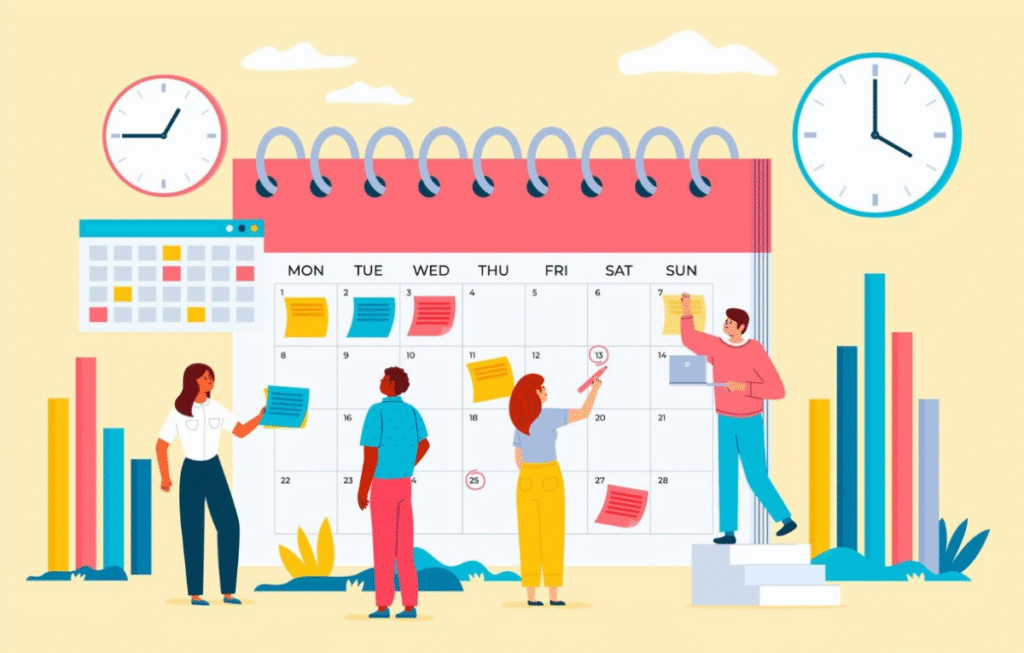Introduction: Balancing Sports, Studies, and Family
It is not easy in the present world for children to balance studies, family, and sports. Particularly when the child desires a competitive sport such as soccer (football). Parents also become anxious about balancing the studies and sports of their children.
East Orange Soccer Academy (EOSA) knows that this is always a concern. Thus, EOSA has planned its training schedule and timings very carefully so that children receive proper practice and learning time, as well as sufficient time for studies, family, and recreation.
At EOSA, training sessions are tailored specifically for every child—a 3-year-old “little kicker” or an 18-year-old player gearing up for tournaments. A separate session is allotted for each age group, depending on age, skill, and convenience.
Here, we will discuss how EOSA’s training schedule is accomplished, what a representative weekly schedule appears like, how it varies according to the season, and how parents may customize it according to the children’s lifestyle.
Scheduling Philosophy and Method

EOSA feels that sports training is not merely a matter of hours on the field—it’s a matter of quality, consistency, and improvement of that time.
The training schedule at EOSA follows three main principles:
- Consistency – Continuing practice allows children to form discipline, habits, and muscle memory.
- Flexibility – Each family has a unique schedule, so EOSA provides several time choices to allow everyone to readily participate.
- Progression – With age, the intensity and volume of training are slowly built up to enable the children to develop in a healthy manner.
It serves the purpose of educating children without exhausting them and keeping them interested in the game.
Age-Based Training Structure
Each child learns at their own rate—some learn quickly, others slowly. As such, training at EOSA is segmented by age and development stages.
(A) 3–5 years: “Little Kickers” Program
- Schedule: Twice a week (45–60 minutes per session)
- Typical Days: Tuesdays and Saturdays Mornings
- Focus: Introduction to motor skills, coordination, and control of the ball
This is an introduction to EOSA’s youngest players. At this age, children learn more about the sense of the game rather than how it is played.
Sessions are a combination of fun games, ball drills, running exercises, and team play. The aim here is not only to educate football, but to encourage children to have self-confidence, friendship, and exercise.
(B) Ages 6–9 years: “Junior Skills Program”
- Schedule: 2–3 times weekly (60 minute sessions)
- Typical evenings: Monday, Wednesday, and Friday
- Focus area: Passing, dribbling, shooting, working with teammates.
When kids are in school, classes are scheduled for evenings, post school time.
In this stage, kids are introduced to the game and basic game ideas (passing, possessing the ball, working with others). We will arrange mini-sided games to allow kids to experience games situations.
(C) Ages 10–13 years: “Youth Development Program”
- Schedule: 3-4 times weekly (75 minute sessions)
- Typical afternoons: Tuesday, Thursday, and Saturday.
- Focus area: Advanced technique, match awareness, and fitness.
Kids are developing quickly at this age-both their bodies and cognitive abilities.
At this stage, EOSA focuses on developing technical and tactical abilities.
Training is now consisting of agility drills, conditioning, and team coordination.
We also arrange friendly or inter-academy matches for kids at this age on weekends.
(D) 14–18 years old: Competitive and Advanced Program
- Schedule: 4–5 days per week (90 minutes per session)
- Typical Day: Monday to Friday nights + weekend matches
- Focus: Tactical training, endurance, and performance
This is for players who are interested in school, club, or college level competitions.
Practice here is like professional level training—in intensive training, match simulation, and strength training.
Coaches not only educate children about the game but also instill leadership, discipline, and competitiveness.
A sample schedule for a typical week
| Day | Little Kickers (Ages 3–5) | Junior Skills (Ages 6–9) | Youth Development (Ages 10–13) | Competitive (Ages 14–18) |
|---|---|---|---|---|
| Monday | – | 5:00–6:00 PM | – | 6:30–8:00 PM |
| Tuesday | 10:00–11:00 AM | – | 5:00–6:15 PM | 6:30–8:00 PM |
| Wednesday | – | 5:00–6:00 PM | – | 6:30–8:00 PM |
| Thursday | – | – | 5:00–6:15 PM | 6:30–8:00 PM |
| Friday | – | 5:00–6:00 PM | – | 6:30–8:00 PM |
| Saturday | 9:00–10:00 AM | 10:30–11:30 AM | 12:00–1:30 PM | Match Day |
| Sunday | Family/Rest Day | Family/Rest Day | Family/Rest Day | Recovery/Light Training |
The above table easily indicates that EOSA has designed a well-balanced schedule for all the age groups such that no child gets exhausted and there is time for study and rest as well.
Seasonal and Weekend Schedule
EOSA operates throughout the year, but the training is seasonally adjusted slightly.
Summer Schedule:
- Morning training to steer clear of the heat
- Special fitness and conditioning sessions
- Particular focus on the need for hydration breaks and water
Winter Schedule:
- Training indoors so that rain or cold don’t interfere with the game
- Technical drills in small groups
- Strength and technique work focus
- Weekend training is eminently suitable for working parents.
Practice matches or scrimmages are played on Saturdays, and make-up classes or relaxation workshops on Sundays.
Training Balance and Rest

EOSA feels that “good training is as important as good rest.” If a child is constantly tired, their motivation and performance suffer.
Thus, EOSA has set clear guidelines:
- At least one full rest day a week
- Cool-down and stretching at the conclusion of each session
- Encouraging players to eat a healthy diet and get plenty of rest (8–10 hours)
It keeps kids in the sport for the long haul and mentally sound.
Structure of Training Session
Every EOSA session is carefully planned scientifically to get the most out of each minute.
A standard 90-minute session consists of:
- Warm-up (10–15 minutes) – Light jogging, stretching, and running
- Technical drills (25–30 minutes) – Ball handling, passing, and shooting
- Tactical drills (20–25 minutes) – Positioning, teamwork, and short games
- Conditioning (10–15 minutes) – Speed, stamina, and strength drills
- Cool-down and feedback (10 minutes) – Coach’s suggestions and discussion
This provides the opportunity for players to build up their fitness, technique, and knowledge gradually.
Flexibility for absent players
If a child is absent on a specific day from a session because of a school function or sickness, EOSA permits him or her to take a make-up session from another batch of sessions in the same week. “Open practice” sessions are also conducted where kids can pick up new skills by practicing among different groups.
Convenient Parent Services
EOSA keeps parents updated at every level.
- EOSA Mobile App – Real-time notifications and schedule updates
- Email Alerts – Match and event details
- Monthly Calendar – Conveniently available on the website
Parent Orientation Sessions are also conducted every three months where parents are informed about kids’ progress by coaches.
Special Training Facilities
EOSA provides a number of added opportunities in addition to daily classes:
- Holiday Camps: 3–5 days of intense training during holidays
- Private Lessons: One-on-one coaching
- Fitness Clinics: For enhancing strength, speed, and agility
- Tournament Preparation Sessions: Pre-competition exercises
These classes are fixed in coordination with normal classes so that there is no clash.
Adaptability based on weather and convenience
- EOSA has facilities for both indoor and outdoor activities.
- In case of rain or when it is too cold, the classes are held in the indoor halls and on normal days the students practice on the outdoor grass.
- If the weather leads to a class postponement, a new time and date will be communicated immediately.
Punctuality and Discipline
- EOSA gives their players a reminder that punctuality is the key to success.
- Players are expected to arrive 10–15 minutes before the session starts so that they can warm up.
- This builds a habit of being disciplined and responsible, which is a quality that applies both on and off the field.
How to Look at the Latest Schedule
Parents and players can always remain updated with the following:
- EOSA website (updated weekly)
- Mobile App Calendar
- Coach Announcements
- WhatsApp and Email Groups
This way, no one gets left behind.
Preparations for Match Day
At EOSA, match day is more than a day of play, it’s a day for learning and self-criticism. Light practice and game strategy are done the day prior to the match.
At a post-match review session, the players discuss their errors and areas where they can improve.
Why EOSA’s Schedule Works

EOSA’s schedule has been developed after years of study and experience.
It works because it:
- Consistent with children’s research and family
- Avoids overtraining
- Offers a stable practice scenario
- Offers appropriate choices for players of all ages
Assists children in learning discipline, time management, and teamwork while still playing sports.
Conclusion
The team at East Orange Soccer Academy hopes to bring every child the love of the game, not the stress. Our adaptable timetable permits each family to select the option that will suit them the most.
From the beginner to the aspiring pro, EOSA’s regulated but changeable timetable gives the child a chance to come to the right direction. Each minute here is utilized purposefully—so kids can learn, play, develop, and most of all—love the game.
FAQs:-
What are the regular training days at East Orange Soccer Academy?
Training sessions are usually held on weekdays and weekends, with flexible options based on player age and program level.
What time do training sessions usually start and end?
Sessions typically start around 4:00 PM on weekdays and run until 8:30 PM; weekend timings vary by program.
What happens if a session is canceled?
EOSA immediately notifies families and arranges a rescheduled training session within the same week.
